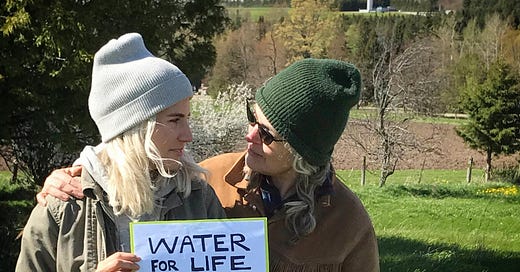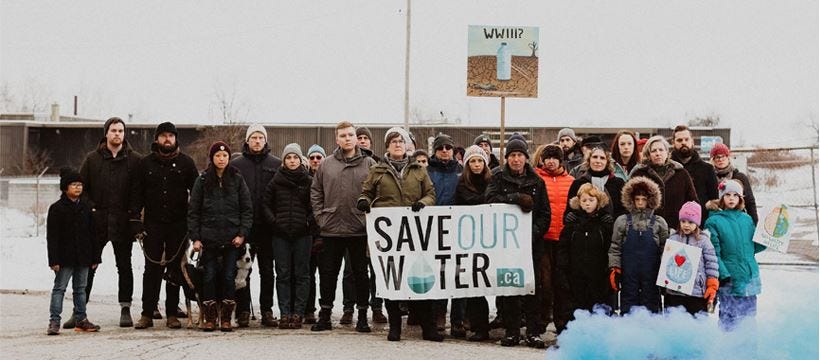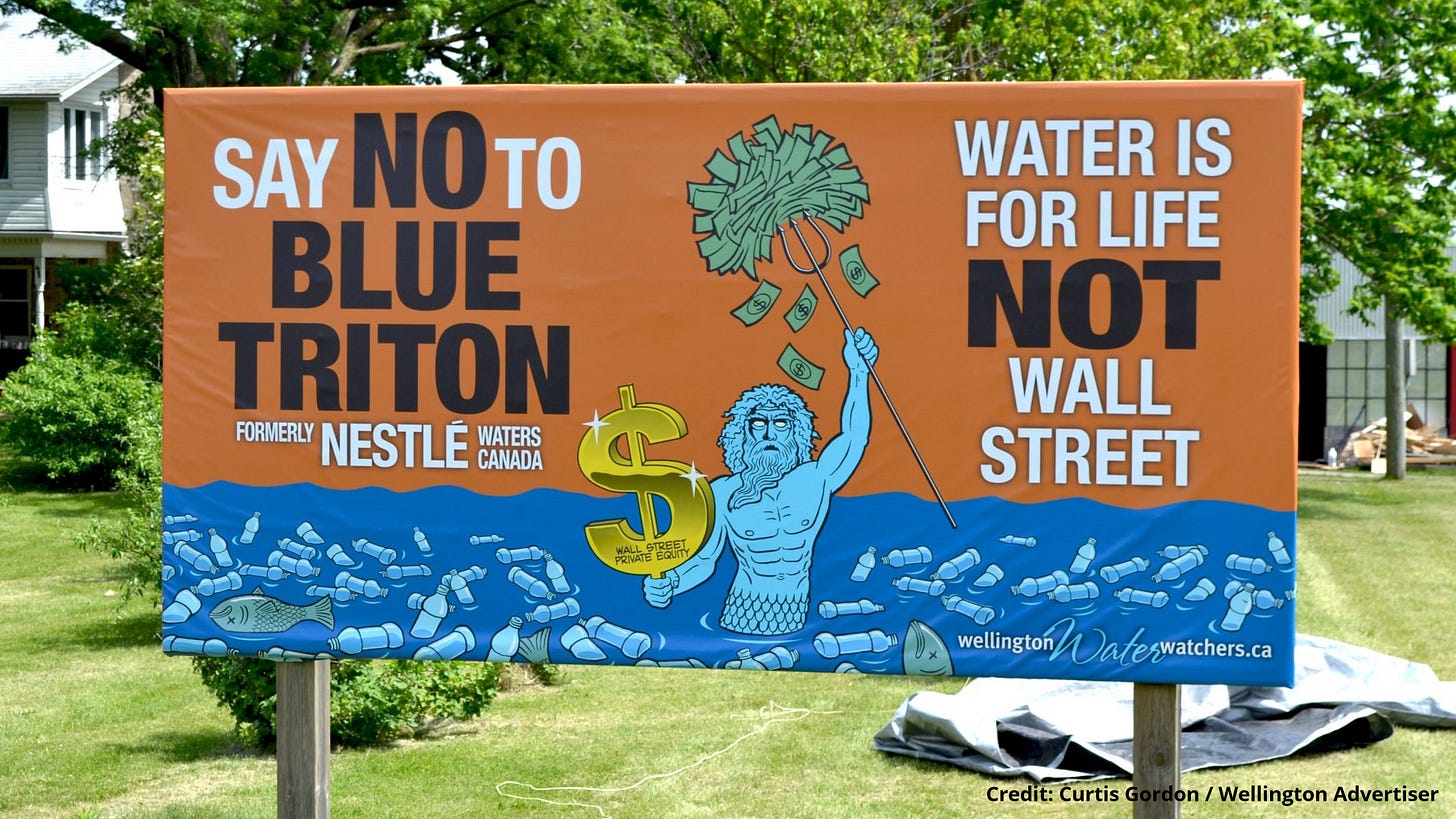Ontario community reclaims public water from private corporations
The Ford government should expropriate the Aberfoyle and Erin wells from Primo Brands and return them to the public commons for the public good because water is for life, not profit.
Rochelle Rubinstein (right), artist, activist and Hillsburgh land steward standing on Bela farm with Primo Brand’s Hillsburgh well in the background Credit: Bela Farm website
Residents of Elora, ON wanted to make sure there would be ample water for future generations to rely on. That meant taking action to prevent their finite groundwater from being packaged and sold by Nestlé – the world’s largest food company.
Locals knew a water permit for bottling would block the township from accessing its best source for new municipal water. That’s when the community came together and formed Save Our Water (SOW).
Over the past 10 years, SOW prevented Nestle, and then BlueTriton Brands, from extracting water for bottling from the Middlebrook well in Centre Wellington Township, ON. That took a lot of organizing and meant educating the community as well as getting buy-in from local businesses and city council, both of whom got on board once they heard the growth projections for the township.
“Water is a miracle that life depends upon. All life. And as we know, corporations tend to be psychopaths. Their big concern is really simply bottom-line profit. So, to put this kind of miracle that life depends upon into the hands of psychopathic corporations is a suicidal idea. It’s anti-life, it’s dangerous for nature, dangerous for humans and it’s an existential threat to life,” Donna McCaw, founding member of SOW told Small Change.
Save Our Water group picture Credit: Save Our Water Facebook
In November 2024, Primo Brands purchased BlueTriton ending all Ontario water-bottling operations in January 2025. BlueTriton owned three wells in the towns of Elora, Erin and Aberfoyle all situated within Wellington County. Aberfoyle was also the location of the company’s largest Canadian water bottling facility.
Ice River, in association with White Wolf Property Management, purchased the bottling facility, but the fate of the three wells remained unclear. Then, on April 2, 2025, Centre Wellington township purchased the Middlebrook well for a purported $1.8 million plus closing costs returning the well to the public commons.
A regional water study from April of 2017 determined Elora was at significant risk for drinking water and needed four new municipal wells. Turns out the best water was located exactly where the Middlebrook well was situated.
It also helped that Elora’s municipal government passed a number of resolutions including water is a public trust and that Centre Wellington was not a willing host community for water bottling purposes of any kind.
On January 1, 2017, Premier Kathleen Wynne’s government imposed a two-year moratorium on new and expanded water-taking permits for bottling. The moratorium was extended by the Doug Ford government until April 1, 2021
“Wynne’s government had put on the moratorium. The Conservative government had continued the moratorium against new permits for water bottlers. So, that let us get our science lined up as well as our community organized,” McCaw said.
“So, once all those things were in place, it was fairly obvious, and I think obvious to BlueTriton too, that getting a permit to take water at the Middlebrook well was going to be a big challenge,” McCaw added.
April 1, 2021, Ontario Minister of the Environment, Conservation and Parks, Jeff Yurek, implemented changes to the Ontario Water Resources Act requiring water bottling companies to have the support of their local host municipality for new or increased exploitation of groundwater in their community.
McCaw knew Elora’s council would never support further exploitation. So, when SOW found out that BlueTriton was planning to sell their groundwater holdings, including the Middlebrook well, they let Mayor Shawn Watters, councillors and staff know. That’s when council and staff purchased the well.
Residents in the towns of Erin and Aberfoyle would also like to purchase the Primo Brand owned wells located in their towns. Instead, the Town of Erin is looking for new well sources to meet current population growth targets that require one new well situated in town as well as two in Hillsburgh where Blue Triton has a currently unutilized established well.
A regional report on available natural sources of drinking water highlighted 16 possible or existing significant drinking water threats located on nine separate parcels situated within the protection area of a proposed new Erin well, known as E9. Those threats could require up to seven risk management plans in order to avoid another Walkerton catastrophe happening in Erin.
Email requests for information regarding the potential for purchasing or expropriating the Hillsburgh site sent to Mayor Michael Dehn and select councillors went unanswered. However, Brian Kavanagh, Director of Infrastructure Services & Town Engineer for Erin, did respond by email stating, “On behalf of the Town, I am providing the following comment. The Town diligently pursued the acquisition of the Blue Triton well property in Hillsburgh, however we were not successful in purchasing the property.”
Email requests sent to Guelph’s Mayor, Cam Guthrie, regarding the Aberfoyle well also went unanswered.
Mike Schreiner, Leader of the Green Party of Ontario and MPP for Guelph Credit: Legislative Assembly of Ontario website
Guelph is the largest city in Canada that relies exclusively on ground water and is situated near Aberfoyle. Guelph is exploring digging a new municipal well in the south end of the city. According to the City of Guelph’s website, water supplies are taking longer to replenish and are more vulnerable to overuse.
Mike Schreiner, Leader of the Green Party of Ontario and MPP for Guelph, believes water is life. “It’s just vital to human life. In addition to that, water is essential for growing food, which we need for life as well. And, so we need to make sure that everyone has a human right to access water,” Schreiner told Small Change.
Schreiner points out that burning fossil fuels is heating the planet and that is causing increasing levels of drought and unsafe weather events.
“It’s more important now than ever that we protect our water resources and we make sure they’re available to the public for the public to use in prioritized ways, starting with publicly accessible drinking water and also making sure we have enough water to grow the food that we need to survive,” Schreiner stated.
BlueTriton Brands, an American company based in Stamford, Connecticut and a former subsidiary of Nestlé, was permitted to take up to 3.6 million liters of water per day from the Aberfoyle well to bottle and ship outside the watershed. That permit expires in November 2026.
Water Watchers “Say No to Blue Triton” campaign included this billboard on Hwy 6 near the entrance to the City of Guelph. Credit Curtis Gordon
Water Watchers (WW) originally wanted Nestlé to exclude the Aberfoyle, Hillsburgh and Elora wells from the 2021 sale to BlueTriton and instead, return them to their respective municipalities. WW, a grassroots non-profit organization working for water protections, asked the Ford government to step in and buy the wells when it became clear Nestlé had no intention of returning the wells to the municipalities. The Ford government chose not to intervene.
Schreiner has always been worried about the commodification of water. He sees it being subject to free trade agreements that could cause Ontarians, and Canadians, to lose sovereignty over their water.
Schreiner explained, “I think that’s heightened now with President Trump because he’s made it really clear that he wants access to Canada’s resources and water. I mean, he’s explicitly said that we should turn on the taps and send Canadian water to the US. I just find that deeply disturbing and very problematic.”
He would like to see the Erin and Aberfoyle wells returned to public ownership, particularly given the fact that Erin and Guelph rely on groundwater for their public drinking water. Schreiner emphasizes the importance of establishing an “access to water prioritization schedule” that situates public drinking water as the top priority.
Schreiner also points to the loss of 75 per cent of the wetlands in southern Ontario which are vital to filtering water as well as the fact that there are quarry operations carrying out below the water table aggregate extraction.
In Guelph, Schreiner actively fought the Dolime Quarry for 14 years over the sheer volume of water the quarry extracted daily to clean rock and dewater the quarry. There was also concern that the quarry had been mined down into the aquitard that is vital to protecting the safety of the water in the aquifer.
That’s why Schreiner thinks Ontario needs to reverse course from the direction the Ford government is pursuing. Schreiner would like to bring in stronger protections for water and stronger protections to maintain habitat, especially wetlands, farmland, tree spaces and forests which are vital to ensuring the water Ontarians do have access to remains clean, healthy and safe.
First Nations water activists (L to R) Professor Dawn Martin-Hill, Layla Staats, Makasa Looking Horse and Wassekom Niin with founding member of the Council of Canadians Maude Barlow Credit: Water Watchers website
Schreiner is concerned by the number of First Nations reserves that are still under boil water advisories.
“I think Canada has a moral obligation to ensure that all First Nations have access to clean, potable water. How can we allow something like this to happen in a country as wealthy as ours when access to clean, safe water should be a human right that every person who resides in Canada should have access to,” said Schreiner.
Six Nations of the Grand River, located along the Grand River in Southwestern Ontario, is the largest reserve in Canada by population and the second largest by land mass. Over 91 per cent of households have no access to clean potable water. Instead, many households spend upwards of $2,500 annually buying bottled water.
The Six Nations Iroquois Confederacy Council of the Grand River Territory and the Haudenosaunee Confederacy delivered a cease-and-desist order to Nestlé Waters Canada in 2019. The order demanded the multinational corporation stop taking 3.6 million litres of water per day from their lands which are covered by the Haldimand Proclamation and the 1701 Nanfan Treaty.
Nestlé, and subsequently BlueTriton, ignored the order while the Ontario Ministry of Environment and Parks extended the permit until 2026 for the towns of Erin and Aberfoyle.
Given the current situation with the Trump government, this is the perfect opportunity for the Ford government to ensure Ontarians have unfettered access to their own water and to prevent further exploitation of Six Nations water reserves. It’s time the Ford government expropriated the Aberfoyle and Erin wells and returned them to the public commons for the public good because water is for life, not profit!
* A version of this article was first published on rabble.ca.
Thanks to everyone who read today’s article. With your financial support, a little Nicoll can make a lot of change.







